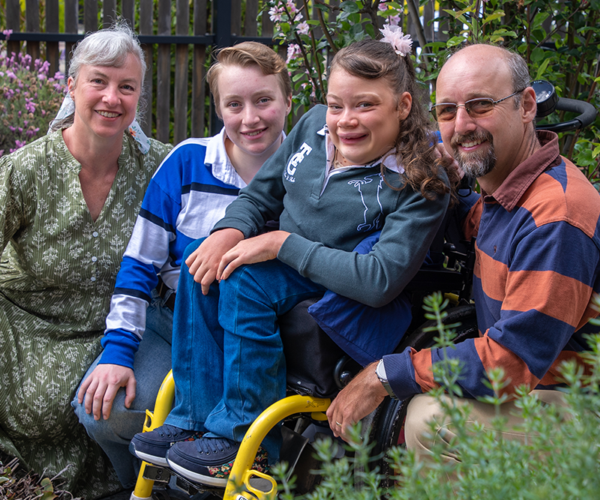In a big win for childhood brain cancer, asthma, and pregnancy health research, the Women’s & Children’s Hospital Foundation (WCH Foundation) has awarded $5.7 million in funding to tackle these areas of women’s and children’s health in the inaugural WCH Foundation Bloom Research Program grant round.
Research teams joined WCH Foundation staff and board members, Women’s and Children’s Health Network representatives and the Minister for Health, the Honourable Chris Picton MP, to acknowledge and celebrate this outcome at an awards night on Thursday 24 August at the Lion Hotel.
This year saw the WCH Foundation launch its inaugural Bloom Research Program grant round, which sees a doubling of our investment into health and medical research. The grant round sought applications for projects focusing on priority areas of women’s and children’s health. After a competitive three-stage application process, grants were awarded to the following four projects.
Immunotherapy for brain and central nervous system cancers
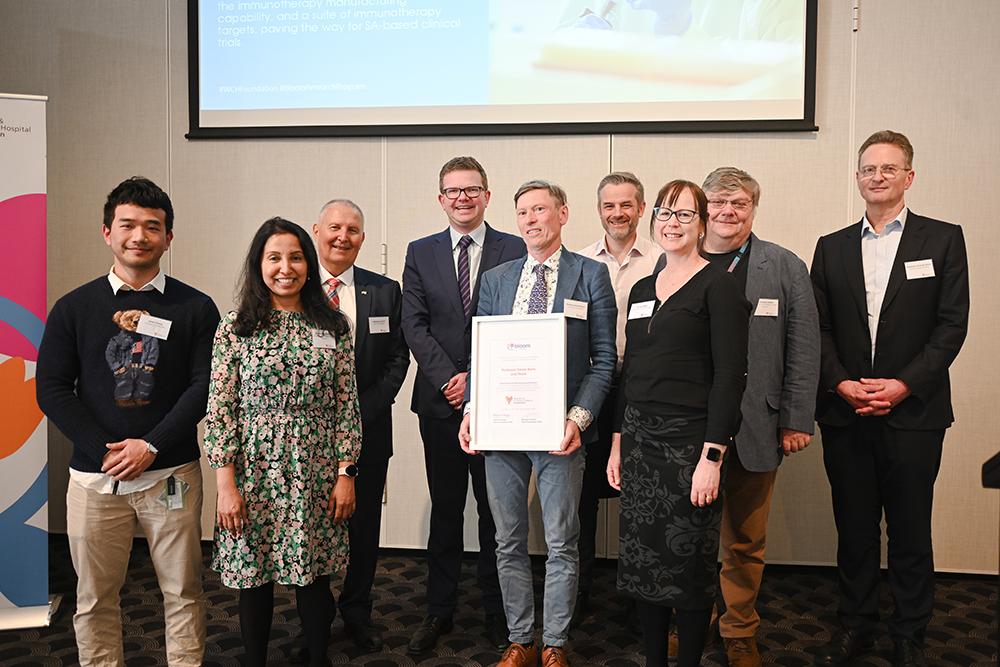
Jieren Zheng, Dr Veronika Bandara, Michael Luchich, the Honourable Chris Picton MP, Professor Simon Barry, Dr Michael Osborn, Dr Lisa Ebert, Dr Timothy Sadlon and Professor Michael Brown.
Professor Simon Barry (the University of Adelaide and the Women’s and Children’s Health Network) and his team will undertake a project titled ‘The SA Paediatric Cancer Immunotherapy Centre: Developing a new personalised immunotherapy for brain and central nervous system cancers’.
Paediatric brain cancers are amongst the hardest cancers to treat. Conventional treatment can result in survivors experiencing significant and debilitating long-term complications. Professor Barry and his team aim to change that by establishing the South Australian Paediatric Cancer Immunotherapy Centre which brings together three groups of experts in a new collaboration.
Bloom Research Program funding will allow them to establish the paediatric cohorts, the immunotherapy manufacturing capability, and a suite of immunotherapy targets.
It is hoped that this research will pave the way for the first SA paediatric clinical trials in immunotherapy for brain and central nervous system cancers, and provide the opportunity to partner with other paediatric oncology centres both nationally and internationally. This ground-breaking research aims to give children with brain and central nervous system cancers not only a better chance of survival, but also a better chance of a healthy future.
An artificially intelligent app for asthma management
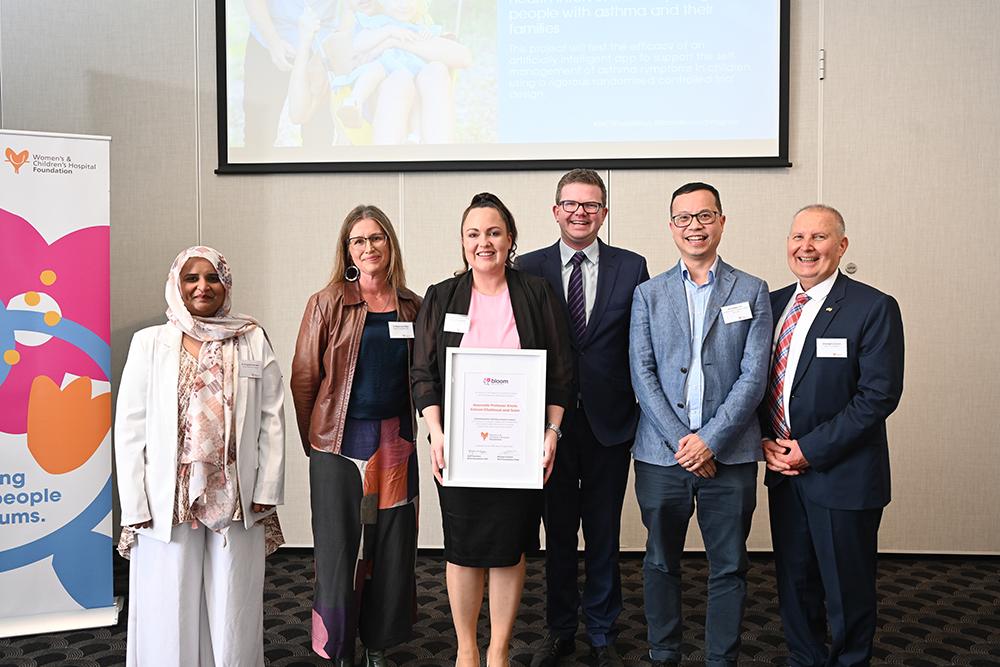
Dr Shagufta Perveen, Dr Rebecca Perry, Associate Professor Kristin Carson-Chahhoud, the Honourable Chris Picton MP, Dr Andrew Tai and Michael Luchich.
Associate Professor Kristin Carson-Chahhoud (Women’s and Children’s Health Network) and her team were awarded a grant for the project titled ‘Clinical trial to evaluate a digital self-management and mental health intervention for young people with asthma and their families’.
South Australia has one of the highest rates of asthma in the world. Even more concerning is that more South Australian children end up in hospital due to asthma than any other part of Australia.
Associate Professor Carson-Chahhoud and her team hope to improve children’s self-management of asthma using an artificial intelligence-based mobile app.
Over the past nine years, Associate Professor Carson-Chahhoud and a team of clinicians, researchers, policy makers, asthmatics, their carers and key community stakeholders have partnered to co-design prototypes for asthma self-management apps. They have demonstrated the acceptability of their prototypes, and now Bloom Research Program funding will allow them to develop these prototypes into a single app, and test its effect on asthma symptoms. How well this app works will be determined through a rigorous randomised controlled trial involving asthma patients under the care of the Women’s and Children’s Hospital, and the wider South Australian community
Ultimately, if found to be effective, this project has the potential to reduce hospitalisations and health care expenditure, and improve the lives of children living with asthma, and their families.
Folic acid optimisation for healthy pregnancy
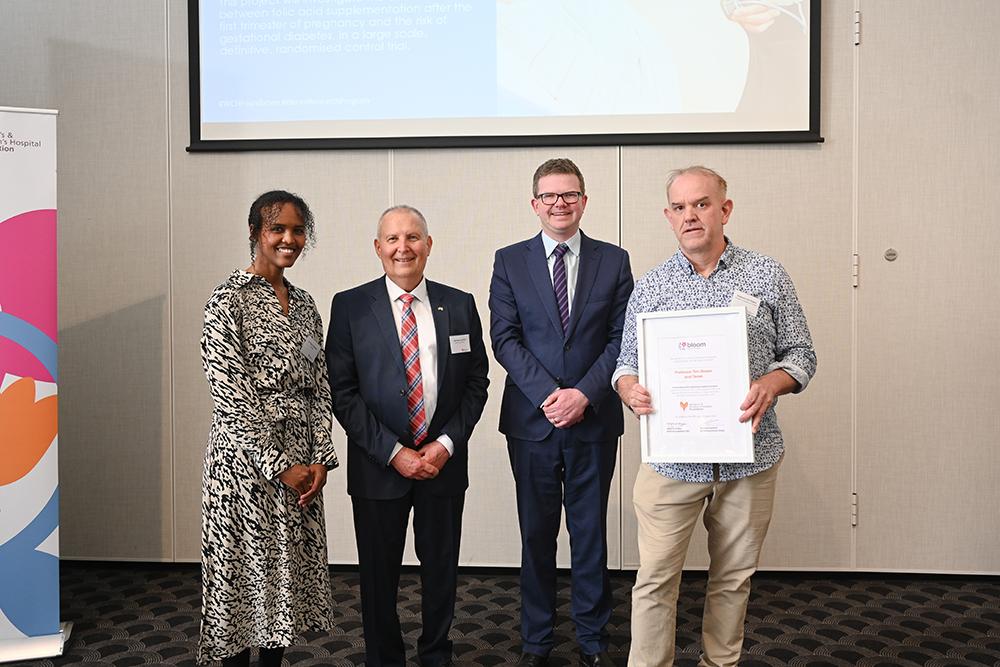
Dr Najma Moumin, Michael Luchich, the Honourable Chris Picton MP and Professor Tim Green.
Professor Tim Green (Flinders University and SAHMRI) and his team were awarded a grant for the project titled ‘Optimising prenatal folic acid supplementation to reduce gestational diabetes, a major risk factor for high birthweight and preterm birth’.
Folic acid supplementation in the first trimester of pregnancy is currently recommended to reduce the risk of birth defects such as spina bifida. However, there is no known benefit of, and potentially some risk associated with, continuing folic acid supplementation into the second and third trimesters.
Professor Green and his team will use Bloom Research Program funding to investigate the association between folic acid supplementation after the first trimester of pregnancy and the risk of gestational diabetes in a large-scale, definitive, randomised control trial of almost 3000 pregnant women.
The interdisciplinary team includes expertise in nutrition, pharmacy, neonatology, obstetrics, health economics and biostatistics.
If this association is proven, this research could lead to changes in policy and clinical guidelines, the reformulation of prenatal supplements, and reductions in the incidence of gestational diabetes and its associated complications.
Genomic predictors of brain cancer survival
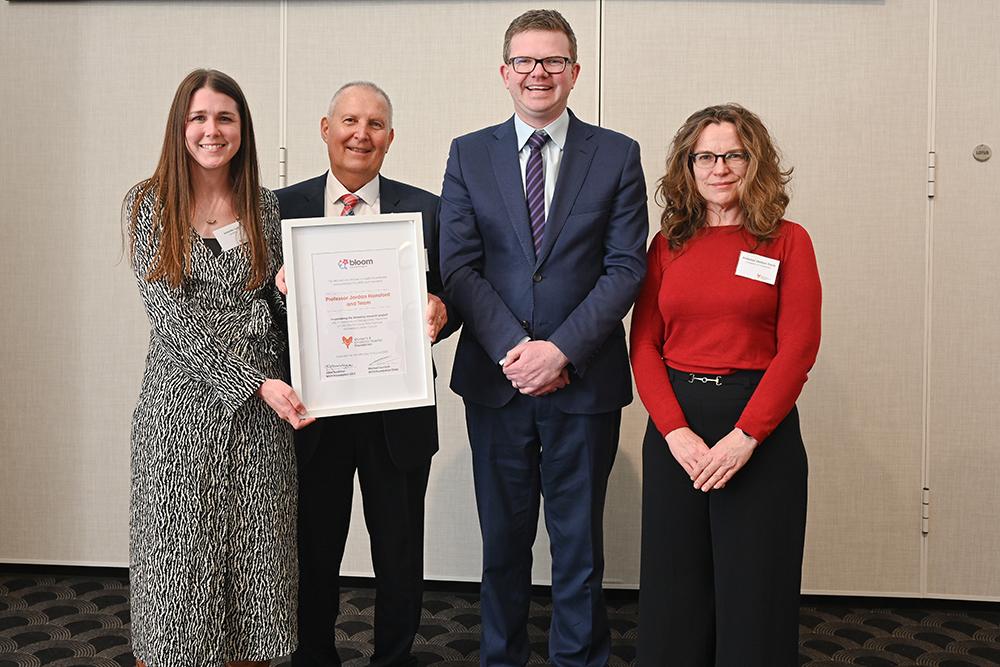
Amanda Luck (representing Professor Jordan Hansford’s team in his absence), Michael Luchich, the Honourable Chris Picton MP and Professor Melissa Davis.
Professor Jordan Hansford (SAHMRI and the Women’s and Children’s Health Network) and his team, in partnership with SA Pathology, were awarded a grant for work relating to the project titled ‘GEL-E – genomic and epigenomic predictors of late effects in long term survivors of paediatric brain cancer’.
Advances in technology means that it is now possible to undertake genomic analyses on brain tumour samples to provide a more precise understanding of the mechanisms of childhood brain cancer and factors that are associated with survival. This information can be used to predict the behaviour of different tumours and possibly assist in determining targets for treatment.
Bloom Research Program funds will allow Professor Hansford and his team, in partnership with SA Pathology, to annotate and conduct pilot genomic and epigenomic analyses of brain tumour samples. In the future, such information could be linked to real-world datasets in order to better understand the clinical and molecular factors associated with survivorship and adverse outcomes.
Future outcomes
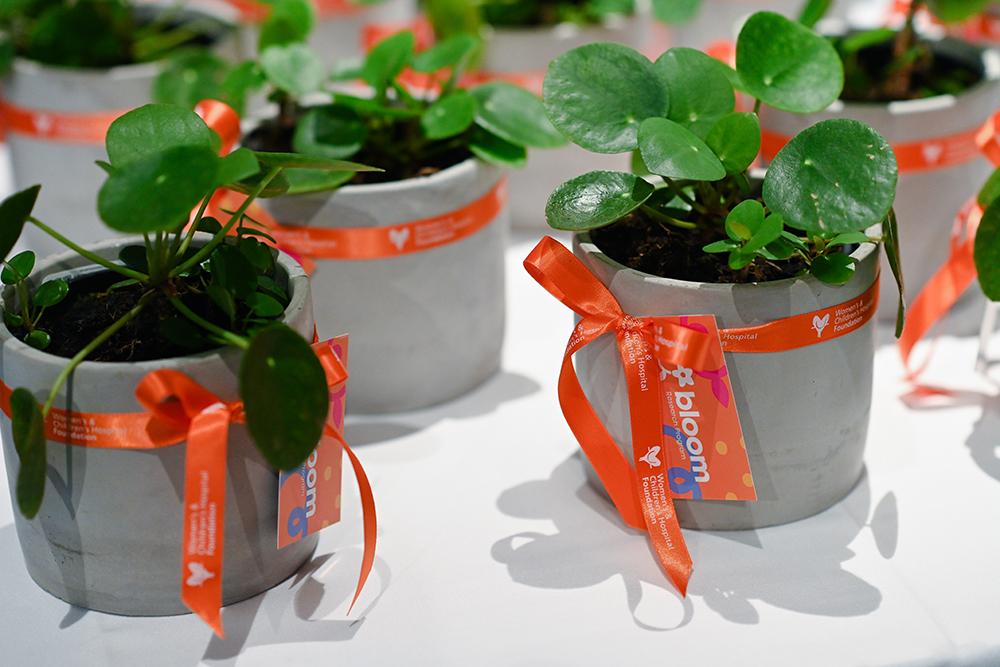
Gifts for the recipients, symbolic of the Bloom Research Program and the flourishing of new ideas.
These four projects will be undertaken over the next two to five years, and will see more than 15 senior researchers, 20 early and mid-career researchers, at least three PhD students, and more than ten partnering organisations involved.
It is the hope of the WCH Foundation and these inspiring research teams that these research projects will improve the lives of future generations of women, children and families across South Australia by discovering better ways to prevent, treat and manage disease.
Vital health and medical research such as this would not be possible without the generous support of the South Australian community.


